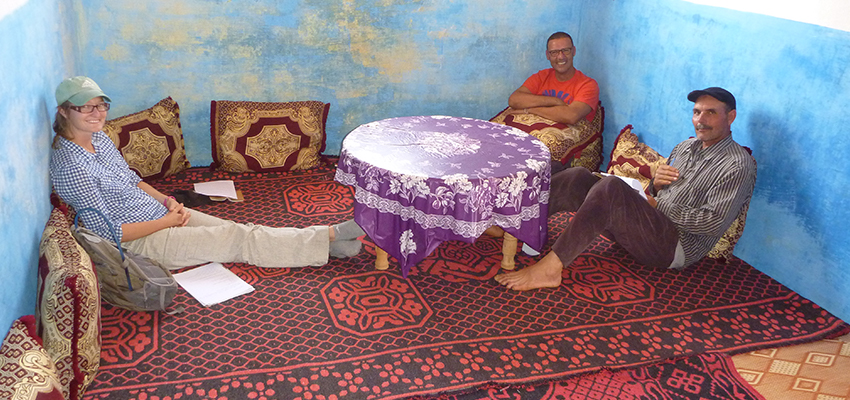
Last year, D-Lab Scale-Ups completed an in-depth needs assessment in partnership with microfinance institutions Al Amana and Grameen-Jameel Microfinance. The initial assessment identified the high cost of animal feed as a major concern of Moroccan farmers. This summer, Gwyn Jones and I have been in Morocco’s Tiflet region over the summer to follow up with farmers and evaluate the area’s meat and dairy value chains in order to evaluate the potential of technology interventions to increase farmer income.
From our preliminary conversations with small-scale dairy producers, a clear picture emerged: the high cost of cattle feed is a limiting factor for increasing milk production, subsequently limiting potential income for the poorest farmers. Particularly during the dry season, when the green pastures available during the spring are no longer a viable feed source, farmers are forced to rely on expensive commercial feeds. Milk production drops significantly during this time and farmers struggle simply to maintain a healthy weight for their cows.
To address this problem, we are exploring low-cost alternatives to expensive commercial feeds. The current leading option is to make and store rain-fed silage - a preserved, more nutritious alternative to the current feed available in the dry season. Farmers could implement this approach primarily with the current resources on their farms and access to a silage chopper. Silage choppers currently exist in small numbers throughout the region but are largely out of reach for smallholder farmers. Because of the relative familiarity with silage compared to other approaches, there is a potential entrepreneurial opportunity in making silage expertise, harvesting equipment, and storage solutions available, and enabling access to these services via financing products.
Gwyn and I are utilizing our time in the field to complete in-depth farmer and stakeholder interviews, allowing us to identify opportunities and constraints in helping to lower the cost of production for small-scale dairy farmers, with a specific focus on the high cost of feed. We are in the process of trying to account for the inputs that make up livestock production in the region – such as seed, fertilizer, feed, hired labor, and farm equipment - in order to evaluate the possibility of a truly advantageous and cost-competitive silage solution.
So far we have visited 30 farms in the Tiflet region and selected 20 for further, more detailed interviews. We also met with various entities participating in the value chain of small-scale dairy production. From university professors, to milk collectors and processors, and all the way back to farmers, everyone is eager to discuss the possibility of decreasing the cost of feeding cattle and thinking big about the future. Our translator, Youssef Khalfaoui, has been instrumental in understanding and interpreting local context and relating our project goals and methods to the farmers and other stakeholders.
The small-scale farmers and livestock owners that we have interviewed have been more than patient in answering all our questions, especially given that we are visiting them during the especially hot month of Ramadan. We have shared meals and laughs as we try to ascertain what makes the small-scale dairy industry tick. We are meeting new stakeholders every day: the Animal Production Department at the Institut Agronomique et Veterinaire Hassan II; agricultural extension services in the region of Rabat-Sale; COPAG, a milk processing cooperative in the Sous Valley with an impressive high-tech facility and technology transfer to farmers; Danone/Centrale Letaire, whose farmer outreach and training programs we will visit this week; the small milk collection centers, or “associations,” notable for their entrepreneurial spirit; and of course, the farmers who share their stories with us.
Given what we have learned since the project’s start and where we find ourselves today, D-Lab's next step is to help develop some of the missing links between institutions with technical resources and microfinance clients. D-Lab will apply its expertise in appropriate technologies to the technology problems in providing access to rain-fed silage, while also facilitating the integration of existing resources in collaboration with the partners and stakeholders described above.
We have two more weeks of interviews with farmers and other stakeholders before we return to MIT to rejoin the rest of the team to analyze the data. Based on our analysis related to silage and other processes, the team will make a recommendation for an intervention that provides a low-risk and low-cost option for farmers to feed their cows, increase production, and ultimately improve their livelihoods. Our next project phase will be to pilot this intervention with a group of approximately 50 farmers. Meanwhile, we will be working with our microfinance partners to design financing products to enable access, and in general working to help design a complete and inclusive value chain around the technology.

